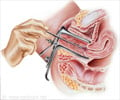Johns Hopkins researchers have found a significant rise in serious complications following prostate biopsy among Medicare beneficiaries.

The researchers emphasize that this new data should serve as a reminder to physicians to carefully weigh the risks and benefits of biopsy for individual patients and take all precautions to prevent infections and other complications.
The Johns Hopkins team's findings are the result of the largest analysis ever performed of Medicare records of American men age 65 and older who underwent prostate biopsies in the last two decades. They found that having a prostate biopsy makes patients more than twice as likely to need hospitalization in the immediate post-procedure period. Those hospitalized had a range of complications, such as bleeding and infection, as well as flare-ups of underlying medical conditions, such as heart failure or breathing disorders.
Overall, mortality rates in men undergoing prostate biopsies did not increase. However, men hospitalized with biopsy-related infections had a 12-fold higher risk of death compared to men who did not have a biopsy.
"Prostate biopsy is an essential procedure for detecting prostate cancers," says Edward Schaeffer, M.D., Ph.D., a Johns Hopkins urologist and oncologist and the study's senior investigator. "Coupled with appropriate screening, prostate biopsies save lives. However, it is important for men to be aware of the possible risks of prostate biopsies, which are often described as simple outpatient procedures," adds Schaeffer, an associate professor at the Johns Hopkins University School of Medicine and its Brady Urological Institute.
In their study, the researchers examined the frequency of biopsy related complications that required hospitalization in more than 17,400 men age 65 and older from 1991 to 2007. They compared these rates to a cohort of 134,977 men during the same time period with similar characteristics who did not undergo a prostate biopsy. The researchers only looked at hospital admissions, not men whose complications were treated in an emergency department or outpatient setting.
Advertisement
There was also a steady rise in the rate of serious infection-related complications. At the onset of the study in 1991, fewer than 0.5 percent of men were admitted to the hospital because of an infection diagnosed following a prostate biopsy. This rate remained stable until 2000, when rates of infection-related complications began to increase to more than 1.2 percent in 2007.
Advertisement
Co-author H. Ballentine Carter, M.D., professor of urology and oncology at the Johns Hopkins University School of Medicine, says, "Based on these findings, we believe that more needs to be done to reduce potential complications. It is important for urologists to determine if a biopsy is appropriate for an individual patient and also if the patient is at increased risk for a biopsy- related complication."
The researchers say that prostate biopsies should only be performed with strict adherence to medical guidelines, and after all potential risks and benefits have been reviewed with patients. More than 1 million prostate biopsy procedures are performed each year in the United States to diagnose and monitor prostate cancer, which is the second most common cause of cancer death among men.
Source-Eurekalert




![Prostate Specific Antigen [PSA] Prostate Specific Antigen [PSA]](https://www.medindia.net/images/common/patientinfo/120_100/prostate-specific-antigen.jpg)








